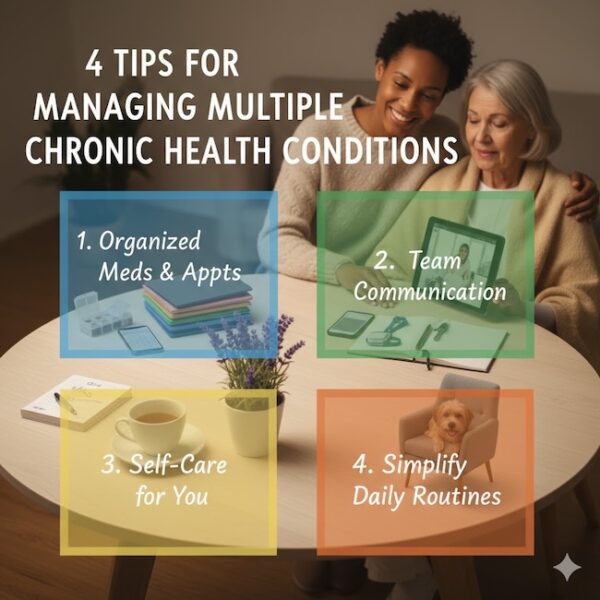When your loved one is juggling multiple chronic health conditions (a situation known as multimorbidity) caregiving can feel like a high-stakes game of medical whack-a-mole. You address one issue, only for another to flare up, creating a complex web of symptoms, medications, and doctors' appointments that can feel impossible to untangle.
The standard approach of treating each problem in isolation often falls short, leaving you and your loved one feeling overwhelmed and unheard. But by shifting to a more holistic and coordinated strategy, you can simplify the chaos, reduce the risk of harmful interactions, and create a sustainable care plan that supports their overall well-being.

Most Older Adults Manage More Than 3 Chronic Health Conditions
Many seniors manage three or more chronic conditions and see multiple doctors and specialists.
Having so many “cooks in the kitchen” can make staying healthy and maximizing quality of life especially challenging.
Chronic health issues like diabetes, arthritis, high blood pressure, and heart disease require frequent appointments and usually, daily medications.
With today’s uncoordinated medical care, it’s too easy for one doctor to overlook what other doctors have prescribed, possibly leading to conflicting treatments or adverse medication side effects.
To prevent problems and get better care for your older adult, use this handy tip sheet from Health in Aging.
It has expert tips on managing multiple health conditions and communicating with doctors. Here, we share four key highlights from the tip sheet.
4 Expert Tips for Managing Multiple Chronic Health Conditions
Health in Aging’s patient-centered tip sheet lists essential questions to ask doctors. These are the four tips we found most useful (there are six in total).
1. Tell the doctor about your loved one's priorities for care
- Ask for medications that work best for your older adult’s lifestyle, specific health needs, and overall comfort.
- Different medications can often achieve the same treatment goal but may work in various ways and have other side effects.
2. Ask about trade-offs between benefits and risks of treatments
- Ask the doctor how each option could affect your older adult’s comfort, overall well-being, and long-term health.
- It’s not always in your older adult’s best interest to choose the most aggressive option. Keep an open mind when considering different treatment options. Sometimes, gently managing a condition is a better approach.
3. Tell your doctor right away if a treatment doesn’t seem to be working or is causing problems
- Your parent or spouse shouldn’t have to suffer through side effects or drug interactions that the doctor couldn’t anticipate.
- If you immediately let the doctor know about problems that come up, they can search for alternatives.
4. Speak up if the treatment plan is too complicated, confusing, or unclear
- Before leaving the doctor’s office, get clear, detailed written instructions on new medications or treatments and how to add them to your current daily routine.
- Make sure you fully understand the instructions and that they're as simple and easy to follow as possible.
- For example, you might ask questions such as: Can this drug be taken with other medications? What time of day? Empty or full stomach?
Final Thoughts on Managing Multiple Chronic Health Conditions
Managing multiple health problems is a marathon, not a sprint, and success is measured by stability and quality of life, not perfection. By embracing these four tips —prioritizing communication, focusing on the big picture, simplifying routines, and building a supportive healthcare team —you are not just managing a list of ailments; you are championing a person.
This approach reduces the overwhelming burden on both you and your loved one, allowing you to spend less time navigating conflicts and more time on what truly matters: meaningful connection and shared moments of well-being.
You are the essential coordinator in this journey, and your strategic, compassionate oversight is the key to navigating this complex path.
Next Steps: Print this tip sheet for the next doctor’s appointment – Living with Multiple Health Problems: What Older Adults Should Know, from Health in Aging (PDF)
Recommended for you:
- 5 Questions to Ask Doctors About Tests and Treatments for Seniors
- 7 Tips for Helping Seniors at the Doctor: Being a Health Advocate
- What Does a Geriatric Doctor Do? How Seniors Benefit From a Specialist
About the Author

Connie is the founder of DailyCaring.com and was a hands-on caregiver for her grandmother for 20 years. (Grandma made it to 101 years old!) She knows how challenging, overwhelming, and all-consuming caring for an older adult can be. She also understands the importance of support, especially in the form of practical solutions, valuable resources, and self-care tips.













